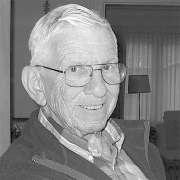
Charles Grier Sellers Jr.
Professor of History Emeritus
Charles Grier Sellers Jr., author or co-author of six books – including the influential The Market Revolution: Jacksonian America, 1815–1846 (Oxford Univ. Press, 1991) and the prize-winning James K. Polk: Continentalist, 1843–1846 (Princeton Univ. Press, 1966) – died at home in Berkeley on September 24, 2021. He was 98 years old.
Sellers was born in 1923 in Charlotte, North Carolina, to church-going parents. His father had left the family farm for to attend business school and by the time Charlie was born he was an executive at Standard Oil. His mother, Cora Irene Templeton Sellers, worked for a church society. As a child Charlie became an avid birder, founding a local Audubon Club when he was 17, an interest he pursued all his life. He also began a lifelong dedication to progressive causes in high school when he heard an AME preacher deliver a powerful sermon. As he put it, “I was one of only two or three white people in this enormous congregation and I guess this was a ‘scales falling from my eyes’ kind of experience that I never got over. I was in dissent with my society from that time on.”
Sellers left North Carolina to attend Harvard College in 1941 but interrupted his History and Literature studies there to serve in the US Army during World War II. He earned his degree in 1947 and returned to North Carolina to enter the PhD program in History at the University of North Carolina; he received his degree in 1950.
Sellers taught briefly at the University of Maryland and then at Princeton for eight years. In 1958 he moved to Berkeley, where he remained on the History faculty until he retired in 1990. Shortly after arriving on the West Coast he became involved in radical politics, first as a Freedom Rider in Mississippi, where he was arrested in 1961, and later back at Berkeley during the Free Speech movement. He was a leader of the local chapter of CORE (the Congress on Racial Equality) and a vocal figure in the anti-Vietnam war movement. Meanwhile he published the first of his two volumes on James K. Polk, James K. Polk: Jacksonian, 1795–1843 (Princeton, 1957), and soon published the second, James K. Polk: Continentalist, 1843–1846 (Princeton, 1966), which won the prestigious Bancroft Prize in American History.
A third and final volume on Polk was put aside (and then abandoned, though he gave his notes to historian Amy Greenberg, who used them to write a biography of Polk’s wife, Sarah) in favor of embarking on The Market Revolution: Jacksonian America, 1815–1846 (Oxford, 1991). Since the second Polk volume, Sellers had mainly published for a general audience; his textbooks and edited volumes and the articles he wrote for them were teaching tools and syntheses. The Market Revolution was also a synthesis, but with a strong point of view that emphasized the destructive power of capitalism. Historian Jill Lepore, in a 2007 essay in The New Yorker (Oct. 29), commented that “Sellers’s was the thesis that launched a thousand dissertations; evidence of the market revolution seemed to be everywhere; it seemed to explain everything.” There followed ample criticism of Sellers’s thesis – mainly around the idea that it made for an overly-determined history – but its impact continued well into the 21st century. His colleague Robin Einhorn, at a 2013 symposium marking Sellers’s 90th birthday, called it “violent, powerful, and beautiful.”
Sellers was engaged not just in the natural world of birds and sailing, and not just in the political world of activism, but also with his students, though he became somewhat jaded toward both students and colleagues as he approached retirement, perhaps annoyed, as David Hollinger put it in his History Department obituary, with “what he took to be academia’s slow and tepid response to the social injustices in American society.” He also cut back on university service, though in the 1960s he was a very active member of campus self-governance committees (Assembly Representation 1962-63 and 1966-69; Educational Policy 1962-63; Library 1962-63; Admissions, Enrollment, and Preparatory Education 1965-66; and COMS 1969-70).
Charles Sellers is survived by his wife, Carolyn Merchant, a professor of Environmental History, Philosophy, and Ethics at Berkeley; his sons, Grier and Steen; his daughter, Janet; and two grandchildren.
This memorial resolution was prepared by the CMR using Sellers’s own memoir, a tribute prepared by Carolyn Merchant, his New York Times obituary, a History Department obituary, the transcript of presentations at Sellers’s 2013 birthday event, and a handful of online reviews of The Market Revolution.
